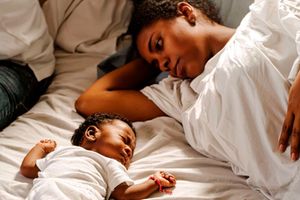Free ultrasound screening to improve maternal care

UNFPA’s trained male midwife Jackson Nyanamba examines Elizabeth Rioba using a portable ultrasound machine at Makararangwe Dispensary in Makararangwe, Migori.
What you need to know:
- Ultrasound is used to diagnose obstructed labor, non-cephalic presentation, single or multiple pregnancy, incomplete miscarriage, molar pregnancy, ectopic pregnancy, foetal abnormality, intrauterine growth restriction and placenta Previa.
- It is also used to measure pelvic outlet and estimate gestational age – even though the degree of diagnostic accuracy may vary depending on when pregnant women present themselves for an ultrasound exam.
Expectant women in Kakamega are set to benefit from free obstetric services after the county received ultrasound machines through a partnership with Italian investors. The initiative is meant to reduce maternal and infant mortality in the county.
The two portable ultrasound machines installed at Matungu Level 4 Hospital and Bushili health center will help detect pregnancy complications early.
The machines were donated under the Rainbow for Africa programme.
Ultrasound is used to diagnose obstructed labor, non-cephalic presentation, single or multiple pregnancy, incomplete miscarriage, molar pregnancy, ectopic pregnancy, foetal abnormality, intrauterine growth restriction and placenta Previa.
It is also used to measure pelvic outlet and estimate gestational age – even though the degree of diagnostic accuracy may vary depending on when pregnant women present themselves for an ultrasound exam.
Accurate assessment of gestational age is useful in distinguishing pre-term newborns from newborns who are low birth weight (but not pre-term), which is important because the needed interventions may differ.
Kakamega Deputy Governor Ayub Savula said health workers at Bushili health center and Matungu Level 4 Hospital will be trained by the Italian partners on how to operate the machines .
Many expectant women give birth without knowing the baby’s health and development status in the womb and this sometimes leads to the death of an infant, the mother or both.
Mr Savula said with the ultrasound scan, the mother can know the condition of her pregnancy as early as possible.
He added that they will work with experienced sonographers from the Society of Radiographers in Kenya so that midwives can learn how to efficiently perform an obstetric ultrasound examination.
“We will try to implement the guidelines of the World Health Organization (WHO) that require a pregnant woman to have at least one ultrasound scan. We will train many nurses on how to use the portable ultrasound machines,” said Mr Savula.
WHO recommends one ultrasound scan before 24 weeks of gestation for pregnant women to estimate gestational age, improve detection of fetal anomalies and multiple pregnancies, reduce induction of labour for post-term pregnancy, and improve a woman’s pregnancy experience.
The deputy governor said they aim to equip every public health facility in the county with the machines.
Ms Susan Akoth from Matungu, a mother of three, said an early ultrasound test will save many lives.
“I am a beneficiary of the obstetric ultrasonography services. My baby was not well positioned in the womb and this had caused complications. When I was two months pregnant, I underwent an ultrasound test after developing some discomfort and was informed that I was carrying twins, something that I had no idea of. In the fifth month, I underwent another test which indicated that the baby was sitting in the womb and it is from there that I was put under the care of specialists,” she said.
She added that in the seventh month of her pregnancy, she was recommended for a caesarian section to avoid complications during birth.
The Rainbow for Africa Kenya chapter director Donald Manyaca said the services will save women from traveling to Kakamega County General Hospital as they will be able to get the services from the health facilities.
“Most women come from low socio-economic backgrounds and can only access services from public health facilities. For them, getting the right care from well-trained public health workers can prove to be the difference between life and death. The screening of mothers helps to notice if the baby is lying in a breech position so that the mother can be advised and assisted for safe delivery,” said Dr Manyaca.
He said the machines also help to identify advance conditions that can lead to emergencies such as excessive bleeding during the delivery process.
He said: “And because the device is portable, midwives can conduct ante-natal outreach at even smaller and more remote facilities in the wider location, thereby reaching more women. Screening is offered free of charge to all pregnant mothers at facilities with the portable ultrasound devices.”
Whereas WHO guidelines recommend at least one ultrasound scan before 24 weeks for a positive pregnancy experience, barriers such as cost of care, inadequate diagnostic services, and a shortage of qualified health professionals often limit the quality of antenatal care for many women.
An estimated 5,000 women and girls die each year in Kenya due to pregnancy or birth complications.
UNFPA Kenya Reproductive Health says with the right skills and equipment such as these portable ultrasound devices, midwives can help avert 65 per cent of these deaths.




